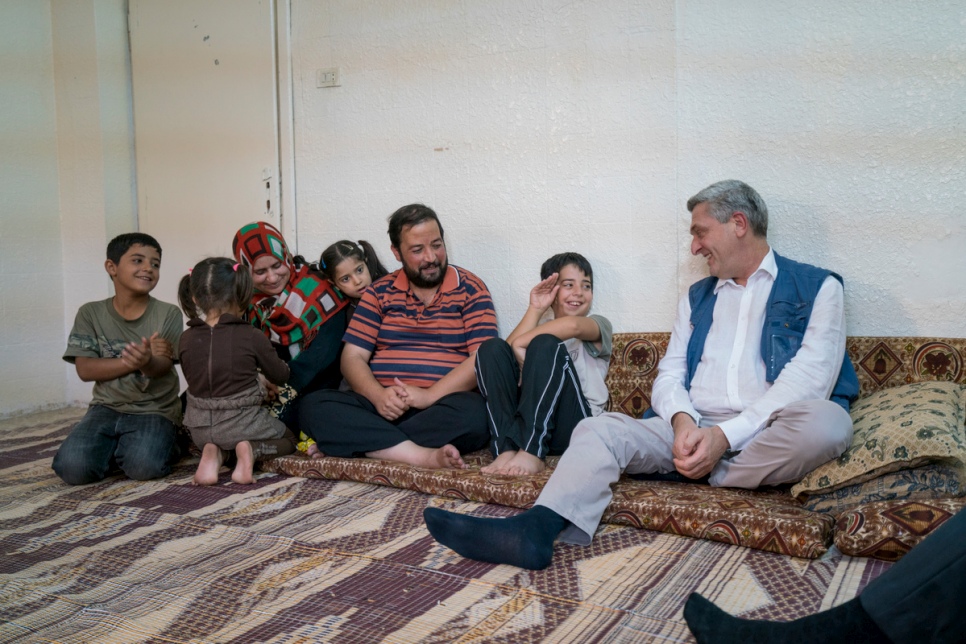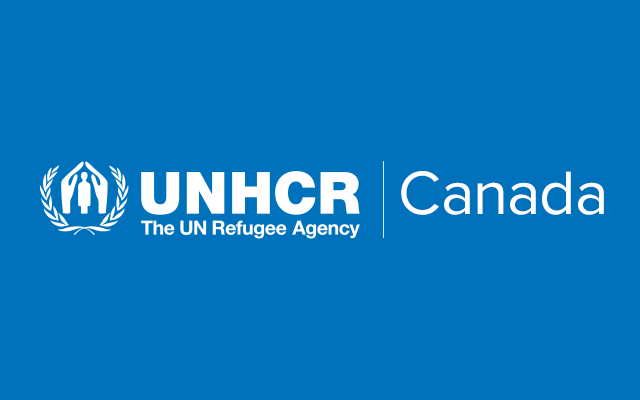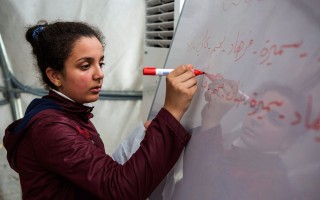With neighbouring countries feeling the strain of the refugee crisis, Filippo Grandi says more Syrians may become trapped within their country’s borders.

UN High Commissioner for Refugees Filippo Grandi visits a family of Syrian refugees in Amman, Jordan. © UNHCR/Christopher Herwig
AMMAN, Jordan – With no end in sight to the fighting in Syria, displacement inside the country is likely to rise even further as people increasingly find themselves trapped within the war-torn nation’s borders, the UN refugee chief said today.
Since the start of the conflict in 2011, to date more than 6.5 million people have been displaced inside Syria, while some 4.8 million have sought refuge in neighbouring countries, UN High Commissioner for Refugees Filippo Grandi told a news conference in the Jordanian capital Amman.
“The borders of Syria are more or less closed or very difficult to cross, and the neighbouring countries feel that they are saturated with almost five million Syrian refugees. That means that the Syrians are trapped inside Syria in this impossible situation,” Grandi said.
“The borders of Syria are more or less closed or very difficult to cross.”
“This means that displacement inside Syria will grow and grow. We estimate 6.57 million people are not in their homes any more, and this number I’m sure is destined to become bigger if hostilities do not cease,” he added.
Grandi was speaking at the end of a three-day visit to Jordan, where one of the issues he discussed in meetings with His Majesty King Abdullah II and government ministers was how to provide humanitarian assistance to the estimated 80,000 displaced Syrians camped close to the Jordan’s northern border with Syria.
Grandi said he fully understood the security concerns that dictated Jordan’s prudence in dealing with the population gathered at the area near the border, known as the “berm”, following a bomb attack in the area in June in which six Jordanian security personnel were killed.
“We fully appreciate that that population may have in their midst elements that would bring insecurity,” he said. “But on the other hand I was encouraged because His Majesty and his ministers were very concerned by the situation of the [people] that are suffering,” Grandi said.
“We’re discussing various options still on how to reach them. We have to be patient because it’s very complicated, but I’m confident that with the cooperation of the government, of many supporting states of the United Nations, we’ll come soon to an arrangement whereby assistance will be able to be delivered to those in the population that are in need.”
Earlier on Monday, Grandi met with Syrian families living in Azraq camp in Jordan’s northeastern desert, currently home to some 35,000 refugees. Among them was Ahmad,* a stonemason from rural Homs who fled his home with his family in November 2015 after their village was overrun by armed insurgents.
They were among some 20,000 Syrians who entered Jordan earlier this year after spending months camped at the berm, before the border was effectively sealed following the June attack. Ahmad described the harsh and dusty conditions they faced at the border, which he said led to his pregnant wife Fatima* becoming seriously ill and almost losing their baby.
“Now we can sleep without the sound of planes overhead and the fear of bombardment.”
“When we got to the camp we immediately felt safer and more comfortable. Now we can sleep without the sound of planes overhead and the fear of bombardment,” Ahmad said.
The family is currently living in a secure section of the camp where those that arrived from the border are housed while awaiting security clearance from the Jordanian authorities before entering the general camp population.
Of the 20,000 that arrived before June, around 7,000 have so far been given clearance by the authorities to leave the secure area. Grandi said that during his discussions with the Jordanian government, they had agreed to accelerate the screening process to allow refugees to join the wider camp population more quickly.
Last month, UNHCR Special Envoy Angelina Jolie Pitt visited Azraq camp to meet with refugees recently arrived from Syria, and called on the international community to do more to assist those trapped at the border. A video from her visit highlighting the difficulties faced by war-wounded Syrians, and the realities of life for Syrian refugee families in Azraq camp, can be found here and here.
Grandi concluded by stressing that responsibility for managing the Syrian refugee crisis could not be left to Jordan and other neighbouring countries alone – a message that was recently reaffirmed by the UN General Assembly at a special summit in New York.
“Refugees cannot be the responsibility of a few countries, especially not just of the countries that happen to be next to conflicts, like Jordan is. It has to be shared internationally. Efforts are being made … but much more needs to be done.”
* Names changed for protection reasons.




